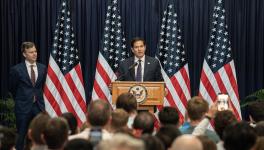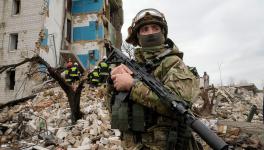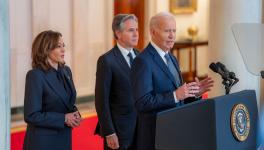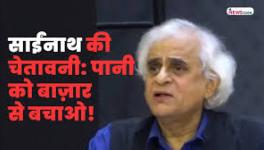Ukraine War Takes Toll on UK Politics
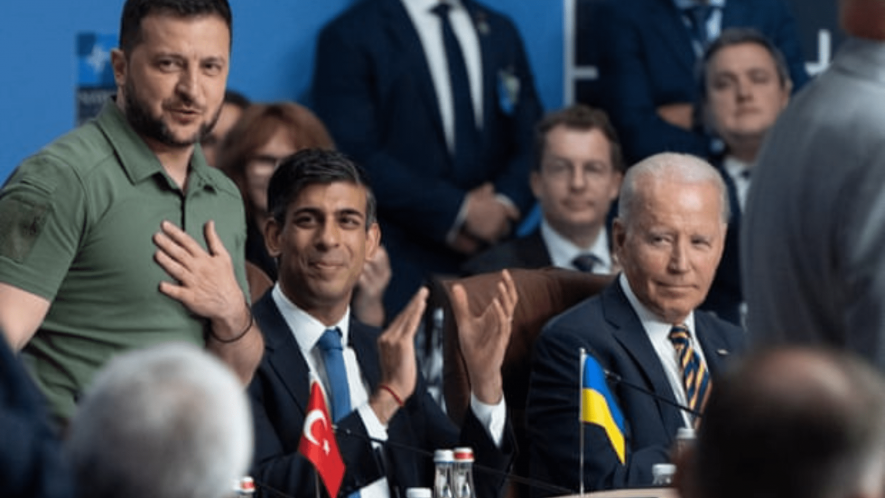
Volodymyr Zelenskiy, Rishi Sunak and Joe Biden at the Nato summit in Vilnius, Lithuania, on 12 July, 2023
The NATO Summit in Vilnius on June 11-12 turned out to be an anti-climax with the fractured relationship between the regime in Kiev and the Western powers surging. What is happening is more of an implosion than a Russian conspiracy.
Certainly, the announcement by the UK Defence Secretary Ben Wallace that he will be leaving the cabinet and quitting politics is much more than about himself or British politics. Wallace had a special role in the Ukraine war, being the oldest member of the British cabinet at 52, a Sandhurst-trained soldier-politician who is well-liked in the NATO establishment at Brussels and an influential pillar of the Deep State in the UK, and, most important, a British politician who had close rapport with the leadership in Kiev and could influence the war more effectively than any European leader with the exception of Boris Johnson.
Wallace made the announcement just after the NATO’s Vilnius summit where he levelled some sharp criticism against the Kiev regime, which probably echoed a widely held sentiment among the allies. Of course, he upset the regime in Kiev — and probably 10 Downing Street too for being so blunt at a time when nerves were fraught as NATO’s signal was not convincing enough for Zelensky.
Zelensky publicly mocked Wallace, further embarrassing the Brits.
Wallace’s exit will spawn many theories, but to my mind, President Joe Biden’s vetoing of his candidacy for the post of the next secretary-general of the NATO played a significant part. Biden’s snub must be hard to stomach at a personal level. There is some merit in Zelensky’s key aide Oleksiy Danilov reacting that Wallace’s outburst in Vilnius displayed a surfeit of “emotion.”
Why was Biden was so staunchly opposed to the British proposal nominating Wallace as the next NATO chief? Evidently, the UK saw the secretary-generalship of NATO as a leap forward in its “Global Britain” project, as it desperately gnaws its way up the greasy pole of big-power politics. And the NATO establishment was positive about it.
The fine print here is that under Wallace, the alliance system would have most certainly taken a big leap forward in overt military intervention in the Ukraine war in some form — a process that Biden would have found it difficult to calibrate in American interests rather than Europe’s, as he has been successfully doing so far.
Make no mistake that Biden’s authorisation to deploy US reserve troops in Europe is a case in point underscoring why the White House will want to continue to exercise total control over the alliance system in Europe in the short and medium term while the weakening of Russia and its eviction from the centre stage of world politics remains an unfinished business.
That said, Wallace should have no big quarrel with the US’ war strategy in Ukraine, or for that matter, with Washington’s post-cold war containment strategy toward Russia. Wallace’s departure should make no difference to the future trajectory of the war, either.
In fact, Russian Foreign Ministry spokesperson alleged today that the US and UK are ultimately responsible for the latest terrorist attack on the Crimean Bridge. But, interestingly, the Foreign Ministry statement later in the day avoided finger-pointing and merely. said, “If the investigation finds that the surface drones that attacked the bridge are of Western origin, and that Western countries played a role in planning, sponsoring and conducting this operation, it will confirm their complicity in the Kiev regime’s terrorist activity.”
The statement expressed the hope that “the international community and relevant multilateral agencies will put their foot down and give a proper assessment of yet another crime committed by the Ukrainian authorities.”
Wallace was Security Minister in the Home Office under PM Theresa May during the explosive controversy regarding the attempted assassination of ex-KGB fugitive and double agent Sergei Skripal in Salisbury in 2017. It was a defining moment. Britain is yet to produce a shred of evidence to substantiate its allegation of Russian complicity but has instead quietly shoved the controversy under the carpet after pushing the ties between the two countries to a free fall from where they never recovered, while Wallace’s political career got a big boost.
Will Wallace’s departure make much difference to Britain’s involvement in the Ukraine war? The answer is no. Undoubtedly, he was next only to Boris Johnson in his commitment to bleed and inflict a military defeat on Russia. During his watch, Britain took a lead role in providing Ukraine with long-range missiles and set an example. It is virtually certain that the SAS played a key role in most, if not all, of Kiev’s attacks on Russian territory. Wallace has been a solid pillar of the Deep State — and he almost made it to 10 Downing Street.
But, on the other hand, in a potential continental war, the British army today is a pale shadow of what it used to be — with a measly stockpile of 40 battle tanks in its inventory and a standing army of 78,060 active personnel, 27,570 Volunteer Reserve and 4060 Gurkhas. Probably, it weighed on Wallace. Indeed, Wallace sought a ramping up of military spending on a “war footing”, with leading military figures and hawks within the political elite backing him.
The Times reported in February that Wallace was pressing “[Chancellor] Jeremy Hunt to increase the defence budget by between £8 billion and £11 billion over the next two years to avoid deep cuts to the armed forces. Wallace was clear in spelling out that with the war against Russia, the military had to be prioritised to confront “growing” threats.
In an interview in February with Sky News, he argued, “Maybe a peace dividend was appropriate straight after the Cold War. We had huge armies in Europe. The Cold War finished and it was right that the taxpayer who’d invested in defence got a return on that. The problem is, that continued and has continued for many decades as the threat has increased. And I’ve been very open here that the threat has increased.”
In the event, though, the UK’s annual defence budget will be £5.8 billion higher in cash terms by the end of the current Spending Review period (£51.7 billion in 2024/25 compared with £45.9 billion in 2021/22). When adjusted for inflation, the increase in defence spending over this period is expected to be just about £1.1 billion.
Who can say Wallace’s departure has nothing to do with Ukraine war?
The Guardian noted that the “similar language” used by Wallace and the US National security Advisor Jake Sullivan in Vilnius “suggested a degree of coordination and marked a rare check on Ukraine’s repeated requests for military and diplomatic help at a summit designed to step up western support for Kviv, but without offering it an immediate pathway to Nato membership, which could lead to a direct war with Russia.”
But the intriguing part is that although Wallace has powerful supporters in the US, no one intervened to discourage him from throwing in the towel and walking away from the ring.
MK Bhadrakumar is a former diplomat. He was India’s ambassador to Uzbekistan and Turkey. The views are personal.
Get the latest reports & analysis with people's perspective on Protests, movements & deep analytical videos, discussions of the current affairs in your Telegram app. Subscribe to NewsClick's Telegram channel & get Real-Time updates on stories, as they get published on our website.










